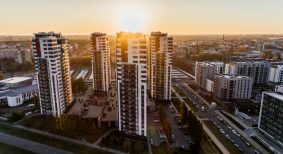Multifamily assets are central to improving investment performance expectations during the second quarter of 2021. Recently released results of the REALPAC/Ferguson Partners Canadian Real Estate Sentiment Survey show industry executives in a more upbeat mood than in the spring of 2020, with 70 per cent of respondents indicating market conditions were somewhat or much better than 12 months earlier and 40 per cent suggesting asset values were somewhat or much higher.
Survey respondents plotted their overall level of confidence at 72 on a scale of 100. That’s up significantly from Q2 2020 when the index score was 46. The gap between reality and possible prospects also narrowed dramatically, as respondents gauged their confidence in current (Q2) conditions at 71, versus 73 for future conditions. One year earlier, there was a 29-point spread in the two assessments.
Looking to the future, 73 per cent of respondents expect market conditions will be even better by Q2 2022; 51 per cent foresee an increase in asset values; 30 per cent anticipate greater availability of debt capital; and 60 per cent expect greater availability of equity capital. Only 9 per cent of respondents predict real estate values will be somewhat lower by Q2 2022, while 40 per cent foresee values will remain relatively constant.
That’s a more optimistic perspective than in Q4 2020 when 35 per cent of survey respondents foresaw somewhat or much lower real estate values by year-end 2021. Nearly three quarters of respondents are looking forward to somewhat or much better market conditions over the next 12 months, while only 1 per cent perceive market conditions will be somewhat worse.
Even so, additional insight from more than 50 commercial real estate executives reveals a more uneven assessment. Select unattributed quotes typically convey more favourable endorsements for industrial and multifamily assets than for office and retail, along with projections for a slower post-pandemic rebound in the latter two sectors.
While real estate insiders note that multifamily income yield had slipped over the previous 12 months, investors remain focused on strong market fundamentals. The spectre of renewed immigration activity, college and university students returning to the renters’ marketplace and continued financial barriers to home ownership bolster the mid- to longer-term outlook.
“The apartment sector feels like a tale of two markets. The apartment valuation market is reaching new heights and, at the same time, market apartment earnings are falling. Buyers are seeing a clear path to the under 30-35 cohort returning to the rental market as vaccines roll out. Current weakness is simply attributed to young people waiting out the pandemic at their family’s home. Canada remains in a housing crisis driven by a lack of supply,” one insider observed.
“The resiliency of apartment income, strong fundamentals and favorable borrowing costs all are leading the market to the safety of apartment REIT investments. A demand wave in Q4 is expected to re-energize revenue lines as millennials return to independent living,” another concurred.






